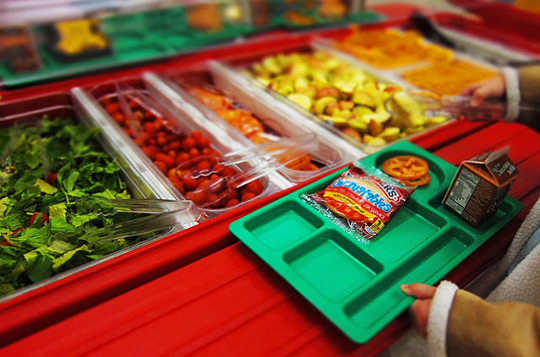
A student getting food from a school cafeteria. Schools across the country focus on offering healthier options and more variety for their students. The pilot program brings fresh lettuce, apples, grapes, oranges, carrots, and blueberries to Michigan and Florida schools. Photo by Tim Lauer, principal of Meriwether Lewis Elementary School in Portland, Oregon. U.S. Department of Agriculture, Wikimedia
Children from low-income families who attend a school that offers free breakfasts do better academically in math, science, and reading, report researchers.
Started by the federal government in 1966, the School Breakfast Program for children from low-income families is administered in coordination with state governments, many of which require local school districts to offer subsidized breakfasts if a certain percentage of their overall enrollment comes from families that meet income eligibility guidelines.
“These results suggest that the persistent exposure to the relatively more nutritious breakfast offered through the subsidized breakfast program throughout elementary school can yield important gains in achievement,” says researcher David Frisvold, assistant professor of economics at the University of Iowa.
25% higher math scores
Published in the Journal of Public Economics, the study examines academic performance from students in schools that are just below the threshold—and thus not required to offer free breakfasts—and those that are just over it—and do offer them.

First Lady Michelle Obama has lunch with students at Parklawn Elementary School in Alexandria, Va., Jan. 25, 2012. The First Lady and Agriculture Secretary Tom Vilsack visited the school to sample a healthy meal that meets the United States Department of Agriculture's new and improved nutrition standards for school lunches. (Official White House Photo by Chuck Kennedy)
The findings show that schools that offer free breakfasts report significantly better academic performance than schools that don’t.
The impact was cumulative so that the longer the school participated in the SBP, the higher their achievement.
Math scores were about 25 percent higher at participating schools during a students’ elementary school tenure than would be expected otherwise.
Reading and science scores showed similar gains, Frisvold says.
The study suggests subsidized breakfast programs are an effective tool to help elementary school students from low-income families achieve more in school and be better prepared for later life.
Source: University of Iowa (Originally published March 16, 2015)
Related Books:
at InnerSelf Market and Amazon























